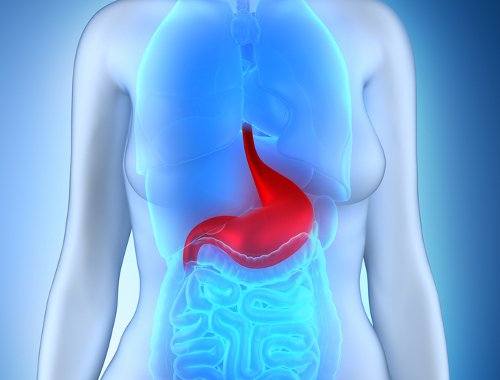Caring for Your Stomach and Preventing Disease


Reviewed and approved by the doctor Nelton Abdon Ramos Rojas
Your stomach is located in the center of your body, where many of your vital functions originate. It processes the food that you eat and plays a role in your mood, your energy levels, and your happiness. Do you want to know more about how to care for your stomach and prevent stomach disease? Read on in today’s article.
Aside from being an aesthetic issue, having a trim belly is actually good for your health. Also, if you keep your stomach in good shape, you’ll feel better. As the saying goes, “good health starts in the stomach.”
On the other hand, if your stomach isn’t working properly, you might feel bloated, tired, moody, or get heartburn.
How can you know if your stomach isn’t functioning properly?

Some signs of problems in your digestive system include:
- Bleeding
- Abdominal bloating
- Diarrhea
- Heartburn
- Incontinence
- Nausea
- Vomiting
- Abdominal pain
- Trouble swallowing
- Weight loss or gain
All of the above signs could be direct or indirect signs of gastic issues. So, if you frequently suffer from one (or more) of these symptoms, it’s important that you see a specialist and pay attention to your habits and lifestyle.
What influences the health of your digestive system?

Sometimes we fall into bad habits without even realizing it. Usually, bad habits are the cause of most stomach problems, including pain, swelling and bloating, gas, and constipation. Let’s look at some common habits that can be unhealthy for some people.
Eating certain dairy products
A lot of people have trouble with dairy. Whole cow’s milk often causes gastrointestinal problems.
However, hypolactasia or lactose intolerance isn’t as much of a barrier as it used to be thanks to advances in food technology. Recent reviews recommend choosing low-fat milk or lactose-free milk, which is still rich in protein.
Give this a read: Non-Dairy Foods Rich in Calcium
Poor eating habits

What are some poor eating habits?
- You don’t wait at least two hours between meals or snacks.
- You snack all the time.
- It’s hard for you to go much time without chewing gum or eating candy.
If this is you, your stomach never gets a chance to rest because it’s working all the time. Even more, it causes discomfort, indigestion, poor nutrient absorption, and pain.
Combining foods that shouldn’t go together
While everyone is different, there are some combinations of foods that can improve your digestion.
Some people believe that eating carbohydrates and proteins in the same meal is a bad idea. However, there’s no scientific evidence to support this claim. Instead, think about trying to identify certain combinations of foods that you eat that might be causing stomach issues.
Not drinking enough water

No doubt you’ve read that you need to drink at least two liters of water a day. This isn’t an arbitrary amount. If you don’t consume enough water, it causes heavier digestion and difficulty going to the bathroom (constipation).
Dr. Michael F. Picco, a gastroenterologist at the Florida Mayo Clinic, recommends drinking food with meals. Contrary to what some people believe, it won’t dilute your stomach acids. Instead, it will help break up foods so that your body can more easily absorb their nutrients.
We recommend reading: Find Out How to Improve Your Health y Drinking More Water Every Day
Overcooking your food
Sure, some foods can’t be eaten raw, but sometimes people overcook their food. This strips it of its nutrients and can actually harm your stomach.
Try to eat more raw foods (fruits and vegetables), no matter whether it’s summer or winter. Juices and smoothies can help satisfy your hunger, giving you nutrients while avoiding the perils of cooking.
Eating too much red meat

If you have colitis, constipation, or diverticulosis, you should try to reduce your red meat consumption.
In general, if you’re going to eat meat, have a fresh salad on the side with lots of vegetables. Try not to eat it more than twice a week.
Tips for caring for your stomach
- First of all, drink teas made with medicinal herbs like chamomile, anise, and mint.
- Get more exercise to stimulate your intestines.
- Eat more fiber from whole grain foods.
- Avoid irritants like alcohol, coffee, and vinegar.
- Chew slowly and enjoy each bite of food. Don’t eat in a hurry, sit down to eat, and cut your food into small pieces.
- Avoid eating when you’re angry, nervous, or anxious.
All cited sources were thoroughly reviewed by our team to ensure their quality, reliability, currency, and validity. The bibliography of this article was considered reliable and of academic or scientific accuracy.
- Thorning, T. K., Raben, A., Tholstrup, T., Soedamah-Muthu, S. S., Givens, I., & Astrup, A. (2016). Milk and dairy products: good or bad for human health? An assessment of the totality of scientific evidence. Food & nutrition research, 60, 32527. doi:10.3402/fnr.v60.32527
https://www.ncbi.nlm.nih.gov/pmc/articles/PMC5122229/ - Heterocyclic amines: Mutagens/carcinogens produced during cooking of meat and fish. Sugimura T, Wakabayashi K, Nakagama H, Nagao M.
https://www.ncbi.nlm.nih.gov/pubmed/15072585 - Genotoxicity of heat-processed foods. Jägerstad M, Skog K.
https://www.ncbi.nlm.nih.gov/pubmed/15914214 - Work performance after dehydration: effects of physical conditioning and heat acclimatization (1958). Buskirk ER, Iampietro PF, Bass DE.
https://www.ncbi.nlm.nih.gov/pubmed/11055570 - Hydration and physical performance. Murray B.
https://www.ncbi.nlm.nih.gov/pubmed/17921463 - Mattson, M. P., Allison, D. B., Fontana, L., Harvie, M., Longo, V. D., Malaisse, W. J., Mosley, M., Notterpek, L., Ravussin, E., Scheer, F. A., Seyfried, T. N., Varady, K. A., … Panda, S. (2014). Meal frequency and timing in health and disease. Proceedings of the National Academy of Sciences of the United States of America, 111(47), 16647-53.
https://www.ncbi.nlm.nih.gov/pmc/articles/PMC4250148/ - Uscanga-Domínguez, L. F., Orozco-García, I. J., Vázquez-Frias, R., Aceves-Tavares, G. R., Albrecht-Junnghans, R. E., Amieva-Balmori, M. et al. (2019). Posición técnica sobre la leche y derivados lácteos en la salud y en la enfermedad del adulto de la Asociación Mexicana de Gastroenterología y la Asociación Mexicana de Gerontología y Geriatría. Revista de Gastroenterología de México, 84(3), 357-371. https://doi.org/10.1016/j.rgmx.2019.03.002
This text is provided for informational purposes only and does not replace consultation with a professional. If in doubt, consult your specialist.








